Kroger: Company Description
Kroger is an American retail company that operates supermarkets, multi-department stores, jewelry stores and convenience stores throughout the US. Kroger supermarkets and multi-department stores offer products across the grocery, fresh food, pharmacy, health and beauty care, apparel, home goods and toys categories. As of February 3, 2018, Kroger operated 2,782 supermarkets under a range of local banner names, of which 2,268 had pharmacies and 1,489 had fuel centers.
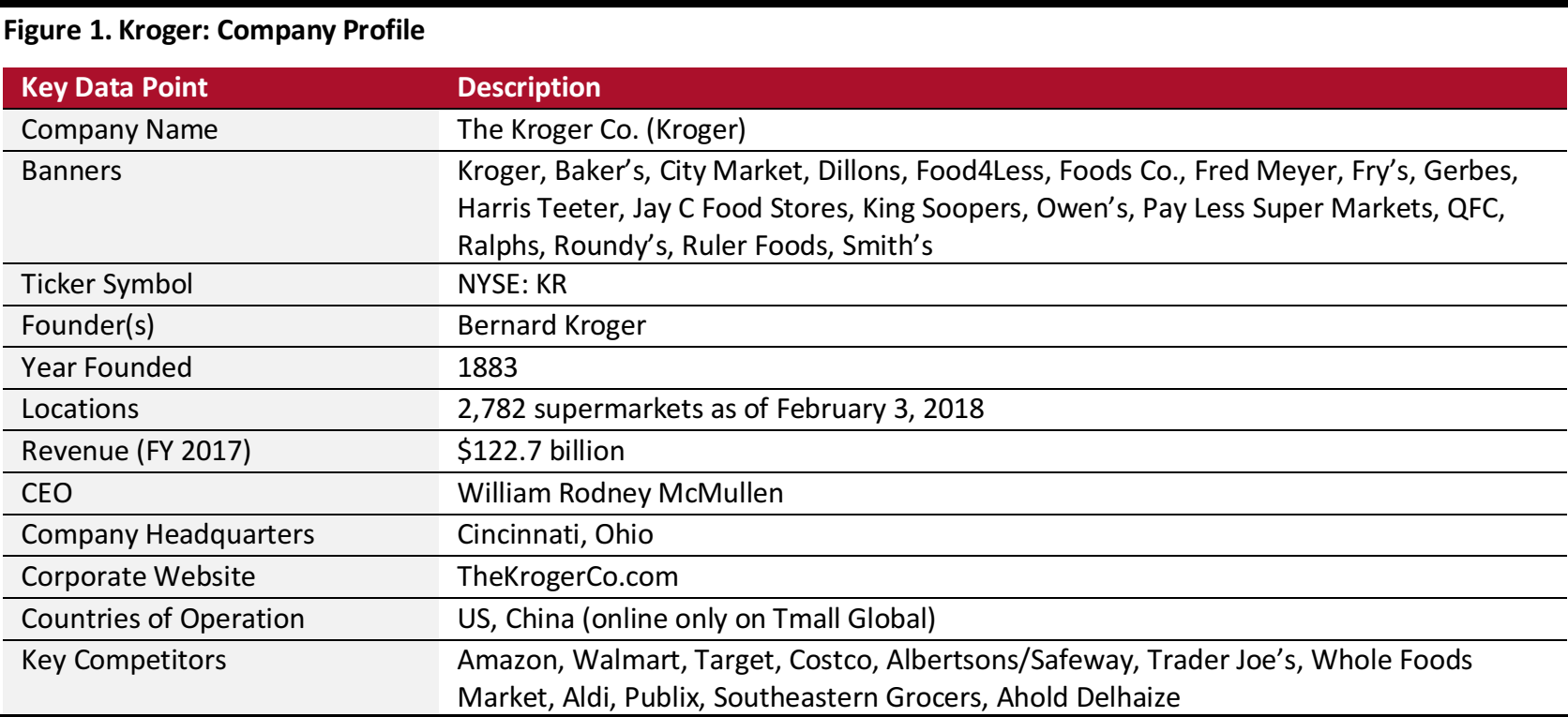 Source: Company reports
Source: Company reports
Key Events Overview, 2008–2018
1) 2015–2018: In the last four years, Kroger has made several strategic alliances and focused on enhancing its online order system and home delivery service. In October 2018, the company announced a partnership with Walgreens to test online order pickup at 13 Walgreens stores. In partnership with Instacart, Kroger plans to offer same-day grocery delivery from an additional 75 stores by late October. Kroger has also teamed up with robotics company Nuro to introduce grocery delivery by self-driving car and the retailer began piloting this new service at a Fry’s store in Arizona in August this year.
In addition, Kroger launched a new e-commerce grocery home delivery service called Kroger Ship in August 2018. Currently available in four cities, this service delivers customers’ online orders as quickly as the next day, in alliance with shippers such as the US Postal Service and FedEx. Kroger Ship appears to be Kroger’s answer to similar services offered by Amazon, Walmart and Target.
Kroger has invested heavily in order to expand its e-commerce offering in the US and internationally, and increase its store fleet through strategic acquisitions. In August 2018, Kroger partnered with Chinese e-commerce company Alibaba to sell Simple Truth products on Alibaba’s Tmall Global platform. In June 2018, Kroger acquired meal kit company Home Chef for $700 million. The acquisition has provided Kroger with access to valuable customer data and technology that complements its own Prep+Pared meal kit offering.
Kroger announced its biggest e-commerce partnership, with British e-grocer Ocado, in May 2018. The partnership is designed to strengthen Kroger’s delivery business with the construction of up to 20 automated warehouses over three years. Like major rivals such as Walmart, Kroger has so far focused on in-store grocery pickup, and the Ocado partnership represents a shift of focus to home delivery. It also constitutes a major expansion of Kroger’s grocery e-commerce capabilities in the face of competition from
Amazon and Walmart
In May 2018, Harris Teeter, Kroger and Food Lion acquired 21 Farm Fresh stores from Supervalu for $43 million, with Harris Teeter and Kroger acquiring 18 of the stores. In April 2016, the company invested $180 million in Michigan to open new stores, including 22 Kroger Grocery Pickup sites (formerly called ClickList sites), which enable customers to pick up their orders while sitting comfortably in their car. Kroger bought supermarket chain Roundy’s for $800 million in December 2015, adding its Pick ’n Save, Metro Markets and Mariano’s stores to the Kroger family. The news surfaced a few months after Kroger acquired seven Hiller’s Market stores in June 2015.
2) 2012–2014: Kroger majorly invested in expanding its family of stores and its store footprint across the US between 2012 and 2014. In January 2014, Kroger acquired supermarket chain Harris Teeter for $2.4 billion, which gave it more than 200 additional stores in high-growth markets. Later that year, in August, Kroger acquired health-focused e-commerce company Vitacost for $280 million. This move accelerated Kroger’s entry into the e-commerce space and enabled it to expand its reach across all US states and internationally.
In November 2013, Kroger announced that it would invest $150 million in 2014 and 2015 to open fuel centers in North Texas and build five new Kroger Marketplace stores, which offer a full line of departments and a broad range of prepared food and general merchandise.
The company also invested in environmentally friendly initiatives over the 2012–2014 period. In April 2013, Kroger invested $1.5 million to install more than 200 Blink electric-vehicle charging stations at its stores in partnership with ECOtality, adding to the 60 stations it had already installed at stores in Oregon and Washington and the 14 stations it already had in Texas. Kroger introduced two new healthy food brands, Simple Truth and Simple Truth Organic, in September 2012 to offer customers organic foods that are free of artificial preservatives.
3) 2008–2011: In the period from 2008 through 2011, Kroger’s inorganic growth was driven by acquisitions. In September 2011, Kroger subsidiary Junior Food Stores of West Florida acquired nine grocery stores and eight gas stations in Memphis from Schnuck Markets, to be operated under the Tom Thumb banner. In February 2010, Kroger added one more company to its health division, acquiring The Little Clinic of Tennessee for $86 million. It acquired two Brookshires grocery stores in the metro area of Brandon and Ridgeland,
Mississippi in January 2010. In November 2009, Kroger opened a fuel center at a Scott’s Food & Pharmacy store, the first fuel center in its Central Division that featured a handicap service button at every pump. In January 2008, Kroger opened in-store, nurse-staffed Premier ExpressCare clinics in two of its stores in Ohio, in partnership with Premier HealthNet.
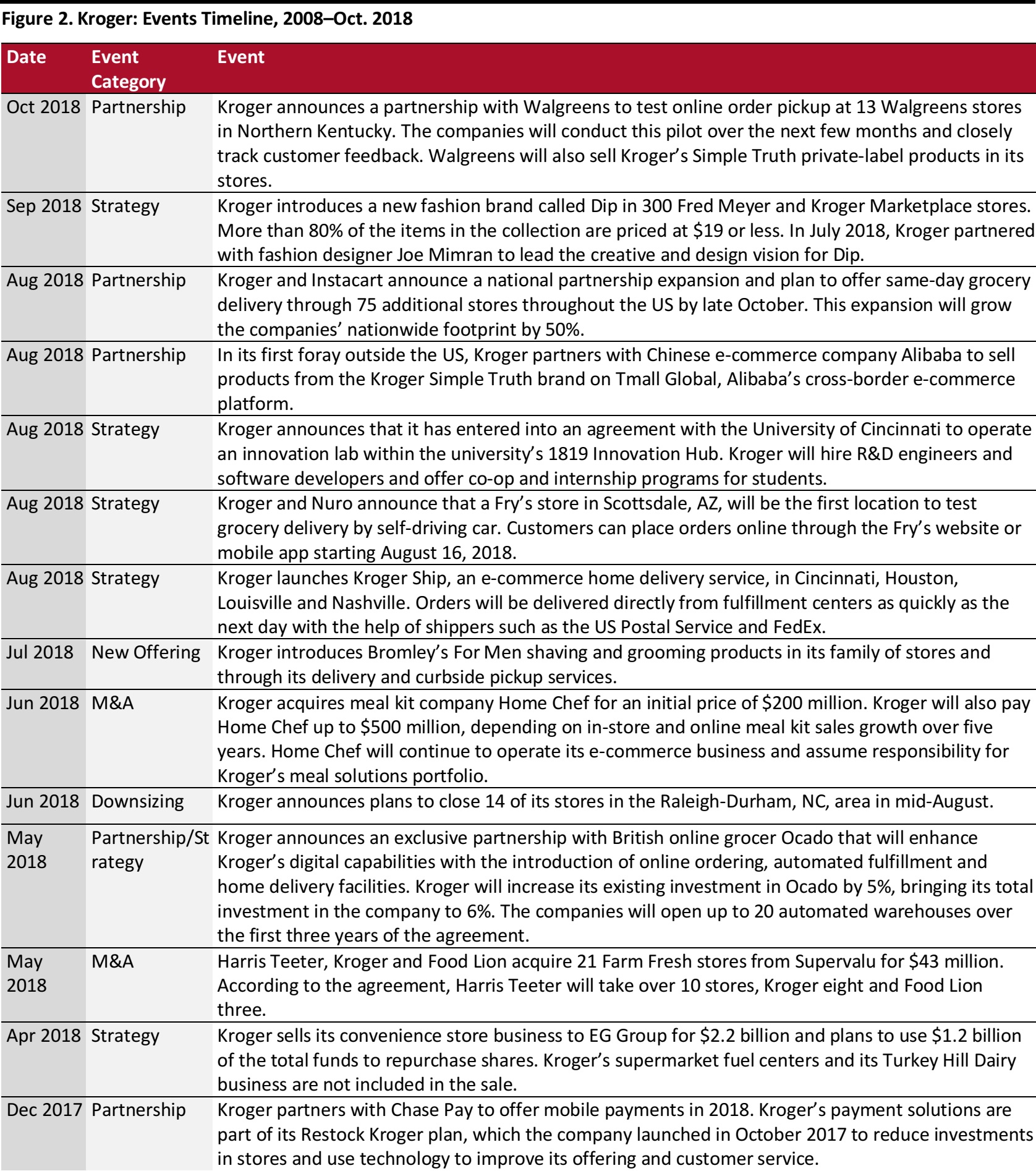
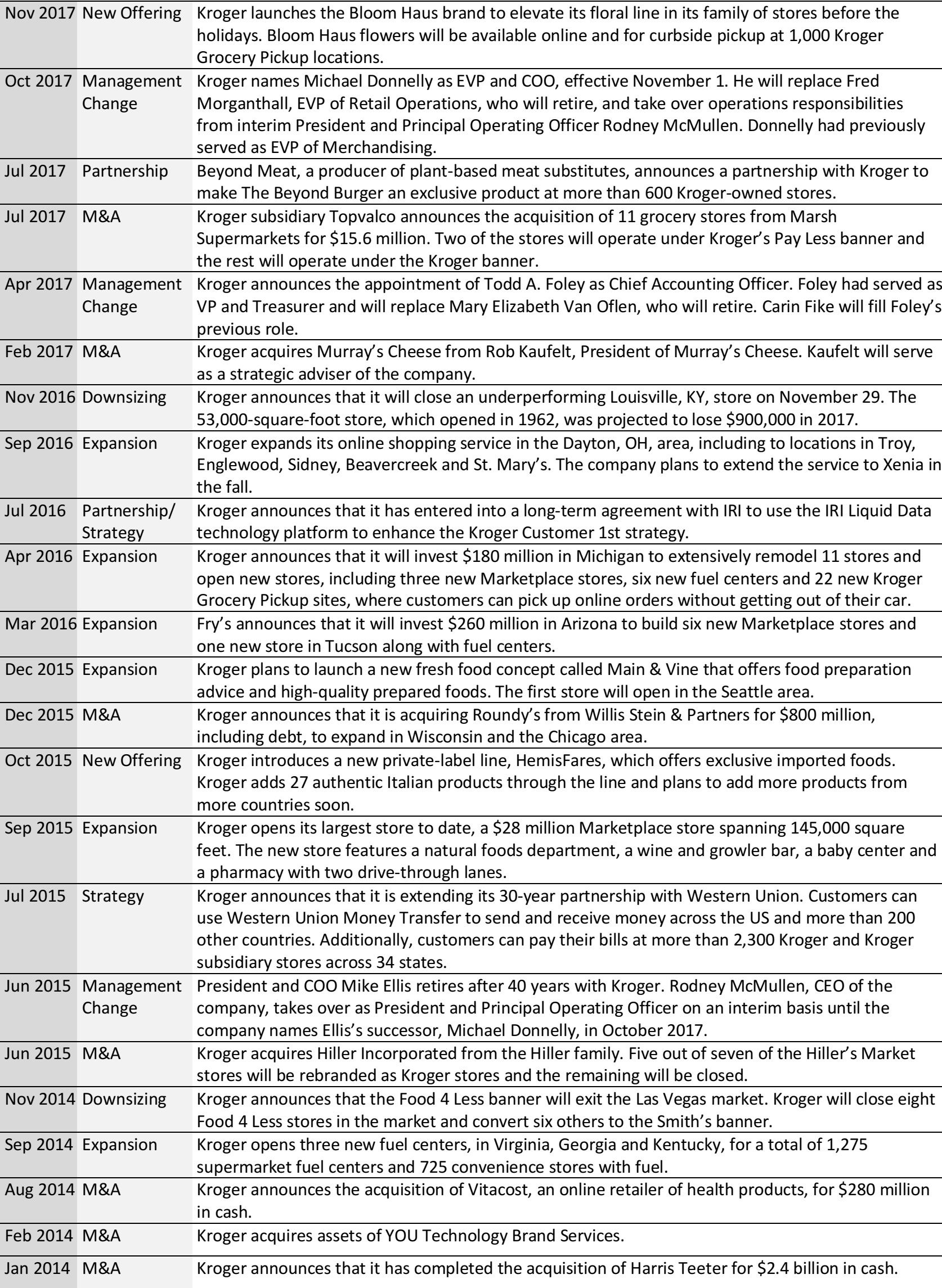
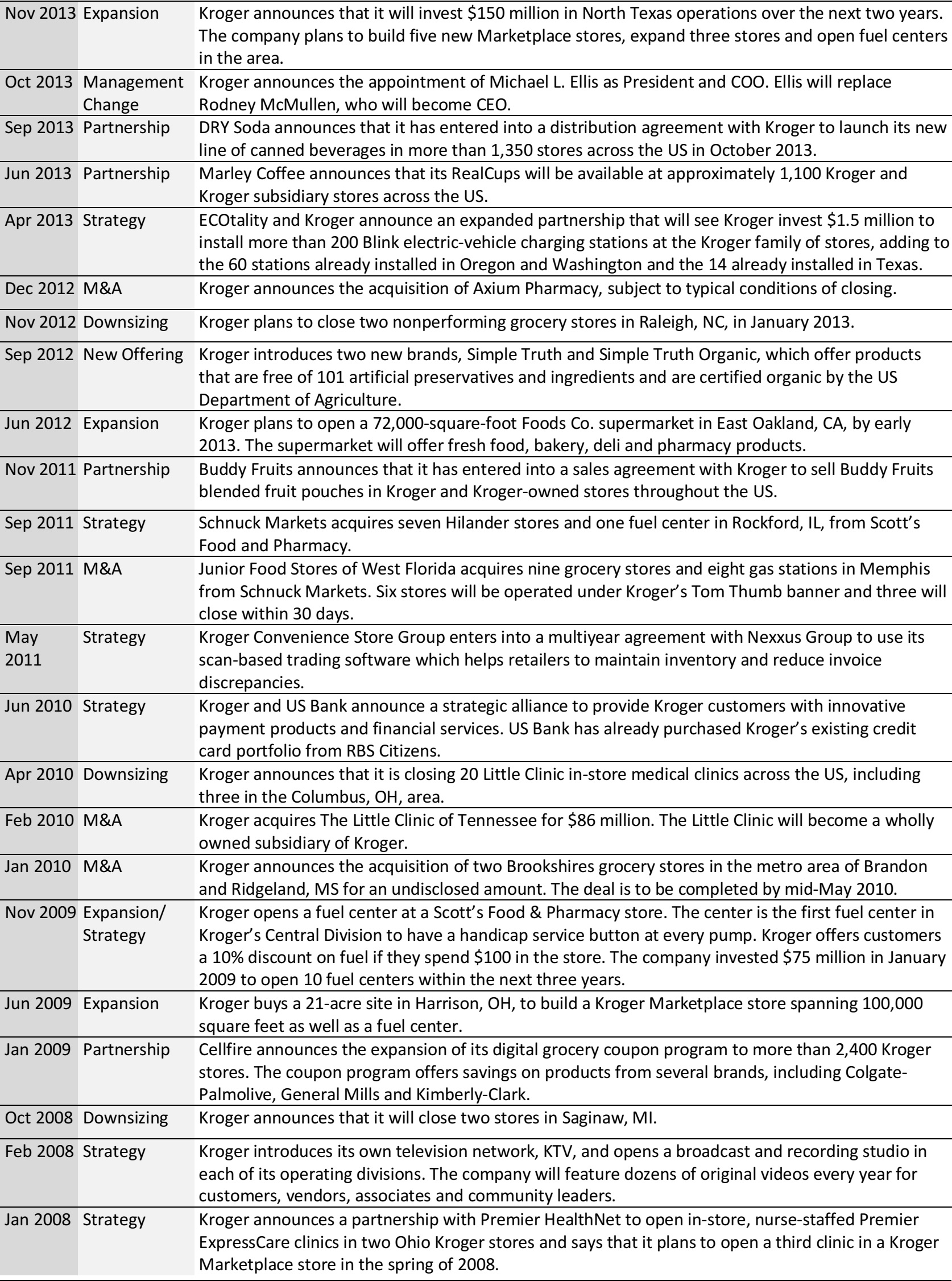 Source: S&P Capital IQ/print publications/Coresight Research
Source: S&P Capital IQ/print publications/Coresight Research
Kroger in Charts
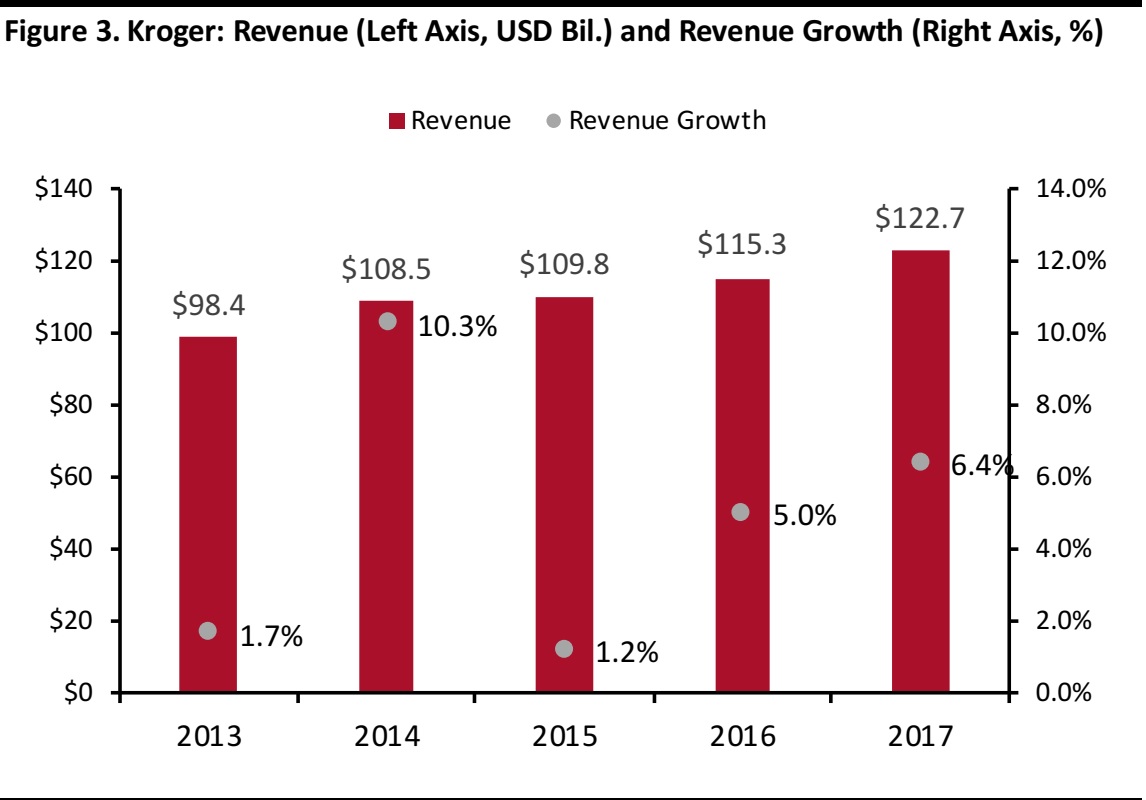
Source: Company reports/Coresight Research
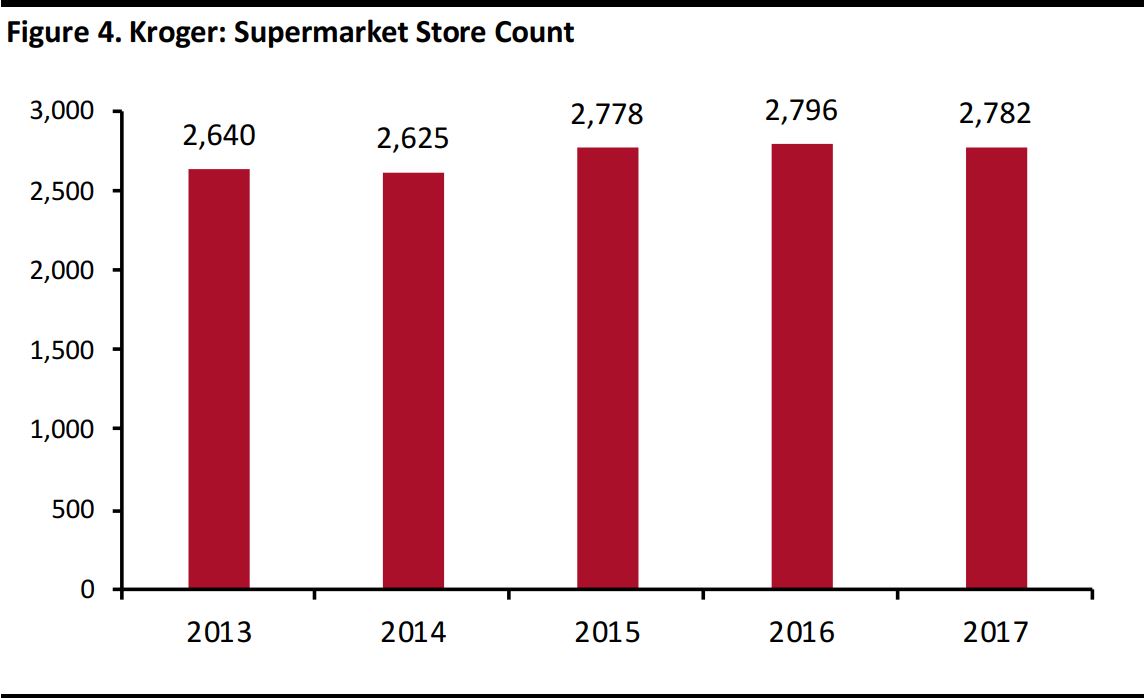
Source: Company reports/Coresight Research
Company Strategy
Kroger aims to redefine the food and grocery customer experience. The company’s primary strategy involves accelerating its digital and e-commerce efforts and expanding its private-label business. Along with expansion in the e-commerce space, the company’s current strategy also emphasizes store real estate ownership. Kroger’s key strategies include:
1) Investing in technology to provide a more convenient grocery shopping experience: Kroger believes that the way people shop has changed significantly over time and that customers are more digitally engaged than ever. The company has been innovating to compete with other players and investing heavily in technology. Its May 2018 partnership with British online grocery company Ocado to build automated warehouses is a big move against competitors Amazon and Walmart.
Kroger operates more than 1,000 Kroger Grocery Pickup sites in the US, and it expanded its “Scan, Bag, Go” self-checkout system to 400 stores in 2018. In October 2018, the company partnered with Walgreens to test online grocery pickup at 13 Walgreens stores. Kroger’s digital revenue grew by approximately 60% in the first two quarters of 2018, mainly driven by Kroger Grocery Pickup.
2) Continuing to grow its private-label offering: Sales of Kroger’s private labels have grown significantly over the last five years, and they now account for the largest proportion of brands sold in Kroger stores. In 2017, customers bought 1.25 million private-label brand SKUs per hour at Kroger stores. Kroger’s own brands play an important role in its merchandising strategy and the company plans to continue investing to grow its portfolio of private labels.
Company Outlook
Kroger’s revenue grew by 6.4%, to $122.7 billion, in the year ended February 3, 2018, while digital revenues grew by more than 90%. To compete with retailers such as Walmart, Amazon and Target, Kroger has been innovating and expanding its e-commerce proposition, offering same-day delivery and curbside pickup for online orders, as well as meal kits and other options.
Kroger has made several strategic alliances in recent years to provide customers with home delivery, including its biggest e-commerce venture to date, its partnership with Ocado to build highly automated distribution centers. The company has also teamed up with Nuro to test grocery delivery via self-driving car, partnered with Instacart to offer same-day delivery and acquired meal kit provider Home Chef. This year, the company launched Kroger Ship, its own grocery delivery service, which offers customers access to an exclusive collection of products and fast delivery, akin to the services offered by Amazon, Walmart and Target.
Kroger is committed to investing in growing its e-commerce offering and expanding its business to enhance the customer shopping experience. These strategies are likely to bolster the company’s sales in the next several years.
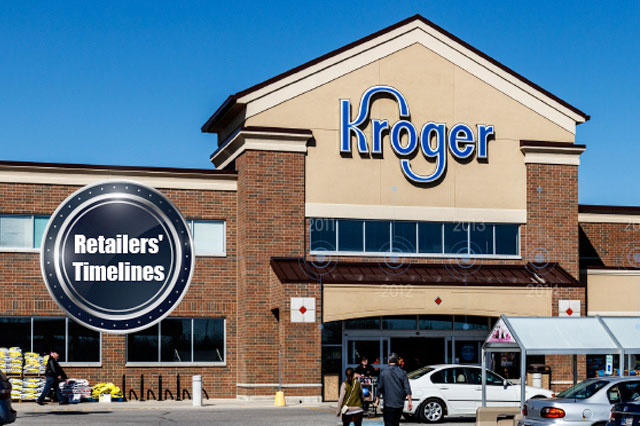
 Source: Company reports
Source: Company reports

 Source: S&P Capital IQ/print publications/Coresight Research
Source: S&P Capital IQ/print publications/Coresight Research
